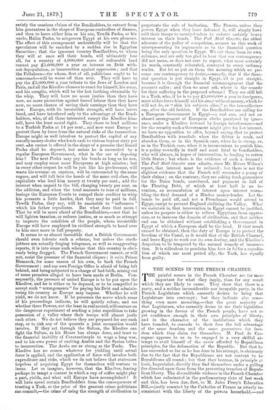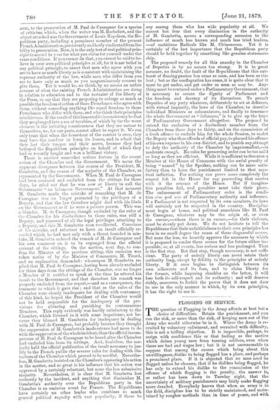THE SCENES IN THE FRENCH CHAMBER.
THE painful scenes in the French Chamber are far more important for what they imply, than for any result which they are likely to cause. They show that there is a party, and a neither inconsiderable nor incapable party, in the French Legislature which earnestly desires to bring that Legislature into contempt ; but they indicate also some- thing even more menacing,—that the great majority of that Legislature, who earnestly desire to see their legislation growing in the favour of the French people, have not as yet confidence enough in their own principles of liberty, and in the character of the institutions which they have founded, to concede to their foes the full advantage of the same freedom and the same guarantees for free- dom which they claim for themselves. M. Paul de Cas- sagnac appears to us to be engaged in a very skilful at- tempt to avail himself of the cover afforded by Republican principles, for the defamation of the Republic. But that he has succeeded so far as he has done in his attempt, is obviously due to the fact that the Republicans are not content to be Republicans all round ; but that they become, in principle at least, Imperialist, directly they find themselves under a galling fire directed upon them from the protecting trenches of Repub- lican liberty. The discreditable violence in the French Chamber which has culminated in the parliamentary riots of last week and this, has been due, first, to M. Jules Ferry's Education Bill,—justly resented by the Catholics of France as utterly in- consistent with the liberty of the private household,—and
next, to the prosecution of M. Paul de Cassagnac for a species of criticism which, when the writer was M. Rochefort, and the object attacked was the Government of Louis Napoleon, the Re- publican party, including a prominent member of the present French Administration, persistently and hotly vindicated from lia- bility to prosecution. Now, it is the only test of real political prin- ciple to accord to your foe what you claim for yourself under the same conditions. If you cannot do that, you cannot be said to be- lieve in your own political principles at all, for it is not belief in any political principle, to assert that men who agree with you are to have as much liberty as is consistent with maintaining the supreme authority of the law, while men who differ from you are to have only as much as you magnanimously consent to give them. Yet it would be, we think, by no means an unfair account of what the existing French Administration are doing in relation to education and to the restraint of the liberty of the Press, to say that they are proposing to enlarge as much as possible the freedom of action of those Frenchmen who agree with them, without conceding anything like equal freedom to those Frenchmen who differ with them, and who think theirprinciples mischievous. If the result of this lamentable inconsistency be that they are plunged into a sea of troubles, of which by far the worst element is the irritating consciousness that they are untrue to themselves, we, for our parts, cannot affect to regret it. We can only trust that when the fever-heat of the contest is over, they may have the candour to learn its lesson, and to admit that they lost their temper and their nerve, because they had betrayed the Republican principles on behalf of which they had so recently fought and won a brilliant victory.
There is another somewhat serious feature in the recent action of the Chamber and the Government. We mean the apparent divergence between the course of the President, M. Gambetta, and the course of the majority of the Chamber, as represented by the Government. When M. Paul de Cassagnac had been censured and excluded from the sittings for three days, he cried out that he was now at liberty to call the Government " an infamous Government." At that moment M. Gambetta made the mistake of remarking that M. de Cassagnac was no longer protected by the privileges of a Deputy, and that the law therefore might deal with his libels on the Government as if he were a private person. This was a blunder. M. de Cassagnac, though excluded by the rules of the Chamber for his disobedience to those rules, was still a Deputy, and possessed of all the legal privileges attaching to a Deputy, and this M. Gambetta soon recollected. Conscious of his mistake, and reluctant to have an insult officially re- corded which he had met only with a threat founded in mis- take, M. Gambetta ordered the remark of M. de Cassagnac and his own comment on it to be expunged from the official account of the sittings. On the motion, next day, to con- firm the Minutes of the previous sitting, this omission was taken notice of by the Minister of Commerce, M. Tirard, and an explanation demanded ; whereupon M. Gambetta re- plied that M. Paul de Cassagnac, having been already excluded for three days from the sittings of the Chamber, was no longer a Member of it entitled to speak at the time he uttered his insult to the Government, and that therefore his remark was properly excluded from the report,—and as a consequence, the comment to which it gave rise ; and that as the rules of the Chamber were clearly inadequate for dealing with contumacy of this kind, he hoped the President of the Chamber would not be held responsible for the inadequacy of the pro- visions for silencing and punishing its contumacious Members. This reply evidently was hardly satisfactory to the Chamber, which listened to it with some impatience, not be- cause they blamed M. Gambetta for inadequacy in dealing with M. Paul de Cassagnac, but probably because they thought the suppression of M. Gambetta's inadvertence had more to do with the suppression of the whole incident, than the official incom- petence of M. Paul de Cassagnac to be heard after the Chamber had excluded him from its sittings. And, doubtless, the ma- jority held the official publication of the insult necessary to jus- tify to the French public the severer rules for dealing with dis- turbers of the Chamber which proved to be needful. Neverthe- less, M. Gambetta insisted on the Chamber's approving his action in the matter, and so great is his influence that his action was approved by a certainly reluctant, but none the less submissive majority. Nevertheless, it is clear that M. Gambetta lost authority by the incident, and anything that diminishes M. Gambetta's authority over the Republican party in the Chamber is an ominous event for France. The Republicans have certainly no other leader who combines so much general political sagacity with vast popularity, if there be any among them who has wide popularity at all. We cannot but fear that every diminution in the authority of M. Gambetta, means a corresponding accession to the influence of much less known and much less tried leaders, —of ambitious Radicals like M. Clemenceau. Yet it is certainly of the last importance that the Republican party should be held together by something like genuine statesman- ship.
The proposed remedy for all this anarchy in the Chamber of Deputies is by no means too strong. It is in great measure, no doubt, the fault of the Republicans that this out- burst of flaming passion has come so soon, and has been so vio- lent ; but as the conflagration has come, it is quite clear that it must be got under, and got under as soon as may be. Any- thing must be ventured under a Parliamentary Government, that is necessary to secure the dignity of Parliament and the freedom and decency of its discussions. To permit Deputies of any party whatever, deliberately to set at defiance, with virtual impunity, the laws of the Chamber, to describe individual Ministers as calumniators, and finally to denounce the whole Government as " infamous," is to give up the hope of Parliamentary Government altogether. The proposal to extend the exclusion of a disobedient member from the Chamber from three days to thirty, and on the commission of a fresh offence to exclude him for the whole Session, to mulct the Deputy who thus offends of official pay, to placard his offence at his own expense in his own district, and to punish any attempt to defy the authority of the Chamber by imprisonment,—is moderate enough. No rules for preserving order can be too mild so long as they are efficient. While it is sufficient to threaten a Member of the House of Commons with the awful penalty of being " named" by the Speaker, nothing can be more satis- factory than to have the punishment limited to that mys- tical infliction. For nothing can prove more completely the respect felt in the House for any proceeding that carries
with it the censure of the House. But if imagina- tive penalties fail, real penalties must take their place. The enforcement of Parliamentary order is the condi- tion sine quit non of Parliamentary authority and influence. If a Parliament is not respected by its own members, its laws will certainly not be respected in the country. Discipline must begin at home, and political anarchists like M. Paul de Cassagnac, whatever may be the origin of, or even the excuse,—where there is an excuse,—for their violence, must be sternly put down. We do not hesitate to tell the Republicans that their unfaithfulness to their own principles has been in no small degree the cause of these disgraceful scenes. But none the less, we heartily approve the measures by which it is proposed to render these scenes for the future either im- possible, or, at all events, less serious and less prolonged. That is the first step. But that step, though necessary, is not suffi- cient. The party of orderly liberty can never retain their authority long, except by fidelity to the principles of orderly liberty. If it once begins to distinguish between its own adherents and its foes, and to claim liberty for the former, while imposing shackles on the latter, it will lose both its self-respect and its authority ; and will deserve richly, moreover, to forfeit the power that it does not dare to use in the only manner in which, by its own principles, it has the right to use it.



































 Previous page
Previous page